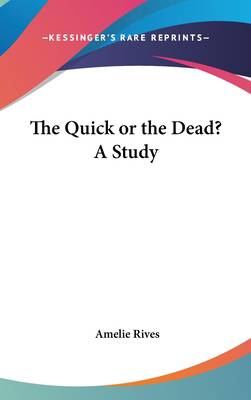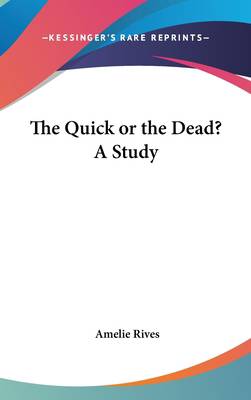
- Retrait gratuit dans votre magasin Club
- 7.000.000 titres dans notre catalogue
- Payer en toute sécurité
- Toujours un magasin près de chez vous
- Retrait gratuit dans votre magasin Club
- 7.000.0000 titres dans notre catalogue
- Payer en toute sécurité
- Toujours un magasin près de chez vous
Description
The Quick or the Dead? A Study by Amelie Rives is a book that explores the theme of life and death through a series of essays and stories. The author delves into the idea of what it means to truly live and the different ways in which people approach death. Rives examines the role of religion, philosophy, and science in shaping our understanding of mortality, and she reflects on the impact of death on our lives and relationships.The book is divided into three parts. The first part focuses on the different approaches people take towards life and death, exploring the ways in which we try to make sense of our mortality. The second part examines the role of religion and spirituality in shaping our understanding of death, while the third part looks at the scientific and medical aspects of death and dying.Throughout the book, Rives uses a variety of literary and philosophical sources to support her arguments, including works by Shakespeare, Nietzsche, and Freud. She also draws on personal experiences and anecdotes to illustrate her points.Overall, The Quick or the Dead? A Study is a thought-provoking and insightful exploration of one of life's most fundamental questions. It is a must-read for anyone interested in the human condition and our relationship with mortality.1888. Poet and writer Amelie Rives (pseudonym of Princess Amelie (Rives) Chanler Troubetzkoy) became an immediate literary sensation when she published the passionate, melodramatic novel, The Quick or the Dead? The book begins: There was a soughing rain asweep that night, with no wind to drive it, yet it ceased and fell, sighed and was hushed incessantly, as by some changing gale. Barbara was a good deal unnerved by the lanternless drive from the station. The shelving road, seamed with abrupt gullies, lay through murk fields and stony hollows, that she well remembered; in the glimpsing lightning she saw scurrying trees against the suave autumn sky, like etchings on bluish paper; the dry, white-brown grasses swirled about the horses' feet in that windless rain; and after what thunderous fashion those horses pounded stableward! They hurled through narrow gateways like stones from a catapult, rushed past ragged trees whose boles seemed leaping to meet them, spun over large stones as through they had been mere fallen leaves.This scarce antiquarian book is a facsimile reprint of the old original and may contain some imperfections such as library marks and notations. Because we believe this work is culturally important, we have made it available as part of our commitment for protecting, preserving, and promoting the world's literature in affordable, high quality, modern editions, that are true to their original work.
Spécifications
Parties prenantes
- Auteur(s) :
- Editeur:
Contenu
- Nombre de pages :
- 148
- Langue:
- Anglais
Caractéristiques
- EAN:
- 9781432601126
- Date de parution :
- 19-08-04
- Format:
- Livre relié
- Format numérique:
- Genaaid
- Dimensions :
- 152 mm x 229 mm
- Poids :
- 390 g

Les avis
Nous publions uniquement les avis qui respectent les conditions requises. Consultez nos conditions pour les avis.






